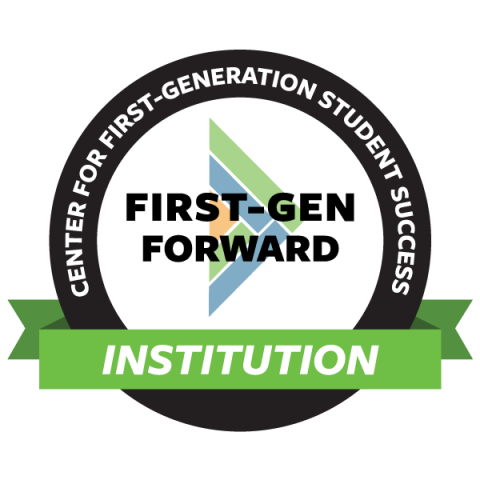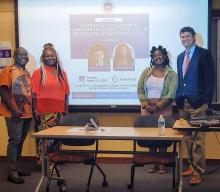
The Center for First-generation Student Success, an initiative of NASPA – Student Affairs Administrators in Higher Education and The Suder Foundation, recently announced their 2020-21 cohort of First-gen Forward Institutions. The First-gen Forward designation recognizes institutions of higher education who have demonstrated a commitment to improving experiences and advancing outcomes of first-generation college students. Selected institutions receive professional development, community-building experiences, and a first look at the Center’s research and resources.
“The Center is so pleased to welcome St. Mary’s College into the 2020-21 cohort of First-gen Forward institutions. Through the application process, it was evident that St. Mary’s College is not only taking steps to serve first-generation students but is prepared to make a long-term commitment and employ strategies for significant scaling and important advances in the future,” said Sarah E. Whitley, senior director of the Center for First-generation Student Success.
With programs like the Sum Primus Sum Exemplar first-generation initiative established by President Jordan in 2017, St. Mary’s College of Maryland supports its core belief that rigorous, relevant, and experiential education should be accessible to everyone with the talent, ambition, and potential to do the work.
“Being chosen to join the FirstGen Forward cohort is a recognition of our accomplishments in helping first generation students succeed, but it’s more than that. It is also a sign of our continuing commitment to assessment and program development so that every student who is prepared to take on the challenge of the National Public Honors College can see themselves in this institution and take that step with confidence,” said F.J. Talley, director of the DeSousa-Brent Scholars Program at St. Mary’s College.
The DeSousa-Brent Scholars Program proactively recruits students from underrepresented higher education groups and provides support both academically and interpersonally, to help students succeed in their journey through college and beyond.
Talley said the College’s efforts to empower first-generation students are not limited to a single office or division.
“It is a priority to the entire institution, from waiving the application fee for first generation students, to the President’s Sum Primus, Sum Exemplar program to the DeSousa-Brent Scholars, our flagship program of academic and leadership excellence,” said Talley.
As a First-gen Forward Institution, select faculty and staff will be afforded multiple opportunities to engage with peer and aspirational institutions who are also creating environments that improve the experiences and outcomes of first-generation students. Selected institutions will send representatives to the First-gen Forward Workshop to be held in Baltimore in June and will participate in monthly phone calls, virtual professional development, goal setting, blog development, annual reporting, and more. After two successful years in the program, institutions are eligible to apply for the Advisory leadership designation.
“The 2020-21 First-gen Forward cohort demonstrates a national movement of two- and four-year institutions dedicated to advancing the success of first-generation students; redefining student success as a movement. We commend St. Mary’s College for their already strong contribution and look forward to engaging more at the First-gen Forward Workshop and throughout their participation,” offered Kevin Kruger, president and CEO of NASPA.
To learn more about first-generation efforts at St. Mary’s College visit http://www.smcm.edu/admissions/how-to-apply/first-generation-students/ To learn more about the Center for First-generation Student Success, visit firstgen.naspa.org.
St. Mary’s College of Maryland, the National Public Honors College, is accredited by the Middle States Commission on Higher Education through 2024-2025. St. Mary’s College is ranked one of the best public liberal arts schools in the nation by U.S. News & World Report. Approximately 1,600 students attend the college, nestled on the St. Mary’s River in Southern Maryland.
NASPA—Student Affairs Administrators in Higher Education is the leading association for the advancement, health, and
sustainability of the student affairs profession. Its work provides high-quality professional development, advocacy, and research for 15,000 members in all 50 states, 25 countries, and 8 U.S. territories. Visit naspa.org for more information.
The Center for First-generation Student Success is the premier source of evidence-based practices, professional development, and knowledge creation for the higher education community to advance the success of first-generation students. Through four strategic priority areas, the Center drives higher education innovation and advocacy for first-generation student success.


